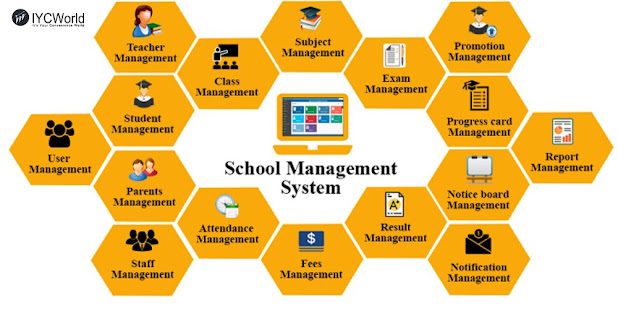How do I choose the best school ERP software?
Today, technology has become indispensable tool of schools worldwide, so we cannot overstate its role in the education also. School ERP is emerging as a transformative step in the evolution of educational institutions as well. For the technological upgradation introduction of School ERP with in educational institutions is essential not only to navigate the complexities of the large operational management but also offering a comprehensive solution to streamline school management.
Need of School ERP Software
Cloud ERP software is essential for
smooth functioning and management of the school as it integrates all the
functions and different department of the schools under one platform. The best
ERP software can easily be accessed by parents, teachers, administrators and students.
Now a day’s having School ERP software is considered as a strategic decision
which can impact the overall effectiveness of educational institutions.
What are the core features of School ERP?
Before the implementation of best ERP software with in your
educational institute you must consider its following features in advance:
l Centralized Data
Management
All the school related data including students records, teachers and
staff records, financial records and much more can feasibly managed by School
ERP software which works as as centralized repository. Such a centralized
management simplifies data retrieval and ensures data accuracy.
l Academic Management
Academic management is another essential feature of School ERP Software
which manages course planning, scheduling classes, grade tracking, etc.
Teachers can provide homework, assignments and course material with the help of
ERP platform and parents and students can access them online.
l Integrated
Communication Management
The Cloud ERP Software offers an integrated communication channel
between teachers, parents, administrators and students. Implementation of such
a software in the school promotes
improved interaction within the school environment and channelize effective communication.
l Financial
Management
By the automation of fee collection, tracking payments and generating
receipts along with the generation of
financial reports, all can be simplifies by School ERP software. It also
controls budget and manages transparency.
l Library and
Resource Management
School ERP software simplifies the management of library and
resources. It enables library operation such as managing cataloging, tracking
borrowed books and generating overdue reminders. Along with that it also assist
in managing school resources such as sports gear, laboratory equipments and
reducing inventory discrepancies.
l Transport
Management
The best school ERP software also manages the system of
transport within the school which allows the easy management of school’s
transport fleet. Such information is beneficial not only for the administrative
department but also for the parents.
Benefits of School ERP Software
A cloud ERP software is designed to serve everyone involved in the
academic process. So its benefits are not limited to a certain boundaries
rather each and every person associated with the school can avail its numerous
benefits, which includes :
ü Technological
upgradation
ü Increased time
management
ü Increase in
parental involvement
ü Effortless fee
management
ü User - friendly
ü Securing data
management
ü Automated timetable
generation
ü Efficient resource
management
ü Enriched learning environment
for students
A well implemented School ERP always contributes to long term cost
saving through improved efficiency and also reduces manual workload.
Conclusion
A school ERP system is a technology based software which is designed to
store, manage and supervise the data to enhance the smoother school operation
and also maintains its transparency. SchoolOnNet is the
best School
ERP Software provider who caters to the needs of modern schools and helps in reflecting
your school’s unique integrated and centralized management.



ChalkBox offers solutions related to ERP for Educational Institutions, streamlining administrative tasks like admissions, attendance, fee management, and academic records. It enhances communication among students, parents, and staff, providing a centralized platform that improves efficiency and decision-making.
ReplyDelete